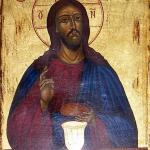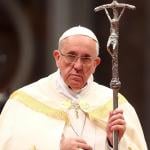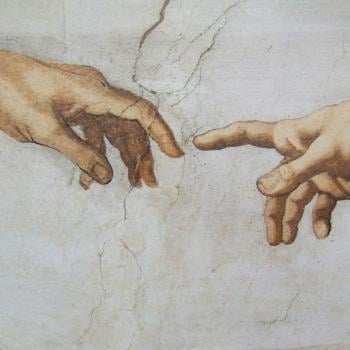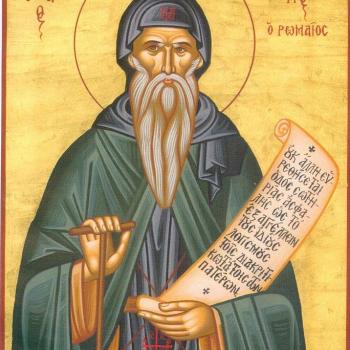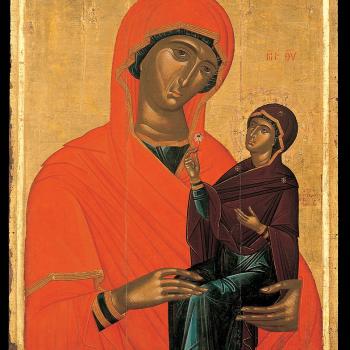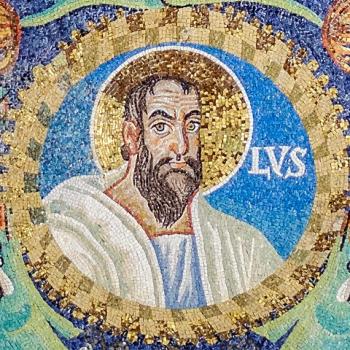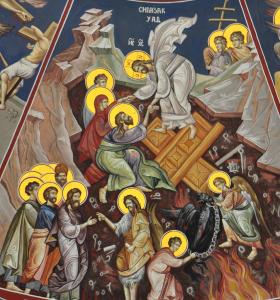
Christ is Risen! He is Risen Indeed!
Every year, it is the Byzantine tradition to have St. John Chrysostom’s Easter Sermon read during the Paschal service; this allows the faithful to hear the way Chrysostom explains that everyone is called by Christ to share in the joy and grace and glory of the resurrection for themselves. Christ’s work, Christ’s accomplishment in his death and resurrection is universal. No one, no matter how sinful, no matter how barbarous or cruel they are, is outside of Christ’s purview; everyone is called to come to Christ, to die to themselves, to their false selves, to the selves established in and through sin which covers up the real person underneath, so that they can join themselves to Christ and experience in and through him the true life. No matter what they have done in the past, Christ loves them, cares for them, and offers them the chance to come to him and share with him the glory of the resurrection for themselves. No one has been left behind. No one is outside of Christ’s love. Even those who deem themselves to be his enemies are those whom Christ loves, and it is through that love, many of them, like Paul, find their way to Christ. He died and rose again. He is the lord of life and death. The sting of death, the sting created by sin, has been overcome; death no longer stands in the way to our ascent to God, but rather, has been transformed so that it can now be a means by which we are brought back to God and God’s love.
The resurrection shows us how all things, which were made by God the Word, have been made new. For in and through him, all things have their origin:
In the beginning was the Word, and the Word was with God, and the Word was God. He was in the beginning with God; all things were made through him, and without him was not anything made that was made (Jn. 1:1-3 RSV).
All things, likewise, have him as their end. He is the first and the last, the beginning and the end. All things come from him, and all things return to him. The eschatological glory revealed in Christ’s resurrection from the dead is meant to be shared and experienced by all. All things are recreated by him, brought back to their original integrity. Those who have free will, those who are creaturely subject and not mere objects, are able to embrace the good offered to them, the grace of the resurrection, and to grow, to become even better than they were at their creation; indeed, they are to be deified, becoming partakers of the divine nature. This deification was always God’s plan for them, but sin and its corruption of death got in the way of that plan. But now, through Christ’s passion and resurrection from the dead, sin has been overcome, so that it does not have the final say over creation. God does.
Thus, in its foundation, all those who were given subjectivity were able to create a kind of destiny for themselves; they were given the freedom to establish what they want to make of themselves, and in doing so, they embraced sin, denigrating themselves by going against their own natural good, and in doing so, caused themselves (and those touched by them) much pain and sorrow. Through such sin, life and death changed their meaning.
Everything born in time, everything created in time, was always intended to have its own particular end. Sin changed the meaning of that end. Sin is said to have caused a spiritual death, a death which leads to the corruption and defilement of the being who sins, so that those who are in sin and die in sin experience death in and through the corruption of sin, making their experience of death one of unending corruption and despair. Christ has changed that. Now, death does not have to be a state of never-ending corruption, but now it can be what it was always meant to be, a point of transition from temporal existence to eternity, a transition which brings us into a new mode of being. For, in the death and resurrection of Christ, the darkness of sin took on the light of the world, and found it could not overcome the light:
In him was life, and the life was the light of men. The light shines in the darkness, and the darkness has not overcome it (Jn. 1:4-5 RSV).
With Christ’s resurrection from the dead, we see the ultimate victory of the light over darkness, a victory which allows Christ to truly call all, even those who had been greatly consumed by the darkness, and find healing and become new creations. Christ takes them by the hand, so that, in and with him, they can be brought into the kingdom of God, where they are to experience unity with God:
Like the teaching about the cross, the importance of the resurrection is that it is a message of hope in God’s creative power through which every manifestation of death-dealing pessimism or party spirit in church and society may be overcome. The resurrection of Christ is the great eschatological reality which offers new life to all alike. It brings the hope of transformed bodies to human beings weighed down with a sense of the body’s relentless vulnerability to decay, dishonour and weakness (1 Cor. 15:42-3). It offers assurance of victory in the battle with mortal humanity’s final enemy: death (verse 54).[1]
Christ is risen, and we can and should arise with him! Christ is risen, and the light of the world shines bright! Christ is risen, let us rejoice and be glad in it! The immanent eschaton shares with the world the glory of the kingdom of God. What happens in time, what we do with our lives, matters. What we do and achieve in time will be the foundation Christ uses to recreate us and establish who we will be in eternity. We are to embrace this, recognizing that already we can and do participate in the eschatological glory of Christ, even if we do so only in part. We are to live our lives, not just temporally, but eschatologically. “To live eschatologically means to allow God to enter history, not only at the end, but at any other moment in time – made possible by the Resurrection as a historic event – that transfiguring time.”[2]
The eschatological resurrection will not destroy the past, rather it will take what happened in time and perfect it, even as the glorious body seen in Christ’s resurrection is the same body he had during his earthly ministry. “He did not indeed put aside the substance of his sackcloth, but its decrepitude, its decay, its misery, and its worthlessness, [when] he consecrated the first fruits of our resurrection.”[3] This is a change which we will experience in the eschaton if we open ourselves to Christ and Christ’ grace; we will be able to rise up with Christ in glory, for he is the firstborn of the dead, representing to us what can and will happen to us in our eschatological resurrection from the dead if we love him and join ourselves to him with that love. We are called to share in the glory of the kingdom of God with him as adopted children of God.
Christ is Risen! Life is victorious over death, and the light is victorious over the darkness! Let us joyfully come together, and celebrate the resurrection. Let us embrace it and the grace which it has provided, so that we can be transformed, both now, as we exist in time, and in eternity, for the glory of God.
[1] Stephen C. Barton, “The epistles and Christian ethics” in The Cambridge Companion to Christian Ethics. Ed. Robin Gill (Cambridge: Cambridge University Press, 2001), 65.
[2] Maksim Vasiljević, Theology as a Surprise (Yonkers, NY: St Vladimir’s Seminary Press, 2018), 40.
[3] St. Bernard of Clairvaux, Sermons for the Summer Season. Trans. Beverly Mayne Kienzle and James Jarzembowski (Kalamazoo, MI.: Cistercian Publicans, 1991), 44 [The Lord’s Ascension: Sermon Four].
Stay in touch! Like A Little Bit of Nothing on Facebook.
If you liked what you read, please consider sharing it with your friends and family!
N.B.: While I read comments to moderate them, I rarely respond to them. If I don’t respond to your comment directly, don’t assume I am unthankful for it. I appreciate it. But I want readers to feel free to ask questions, and hopefully, dialogue with each other. I have shared what I wanted to say, though some responses will get a brief reply by me, or, if I find it interesting and something I can engage fully, as the foundation for another post. I have had many posts inspired or improved upon thanks to my readers.


